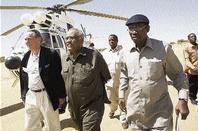
U.N. Special Envoy for Darfur Jan Eliasson (left) and African Union Special Envoy for Darfur Salim Ahmed Salim (centre) arrive in Um Rai on Wednesday, for a meeting with key commanders of the non-signatory rebel groups to the DPA (Darfur Peace Agreement)). - Reuters
Khartoum, Sudan (AP):
The United Nations and African Union envoys to Darfur said yesterday, they were "encouraged" about prospects for peace in the country's troubled region after two days of talks with factions in Sudan.
The two - U.N.'s special envoy tasked with re-energising the Darfur peace process, Jan Eliasson, and AU's Salim Ahmed Salim - have been in Sudan this week for meetings with Khartoum officials, rebel leaders and stops in Darfur.
"We are encouraged by the initial reaction of everyone we have met on this issue of reduction of the escalation of violence" in Darfur, Salim told reporters.
There was a "readiness" by all to improve the Darfur Peace Agreement signed last May in Abuja, Nigeria, but which had failed to end the fighting, he said.
The Darfur Peace Agreement called for a cease-fire, disarmament of militias and a protection force for civilians but did not specify the composition of such a force.
The deal was supposed to help end the conflict, but instead sparked months of fighting between rival rebel factions, although fighting between Sudanese armed forces and the Sudan Liberation Army, or SLA, the main rebel group, has decreased since the deal. Rebels who do not support the Abuja accord include a breakaway faction of the SLA and the Justice and Equality Movement.
Reduction of violence
U.N.'s Eliasson said he expected a "visible sign of reduction of violence" after their mediation and efforts to bring parties that did not sign the peace deal on board.
However, Eliasson warned against fatigue prevailing among humanitarian workers in Darfur but expressed hope the government in Khartoum would allow a U.N. human rights team to enter the country on a fact-finding mission.
That rights team said Wednesday it would cancel a planned visit to assess alleged atrocities in Darfur because Khartoum had failed to give them visas and they could not wait indefinitely in the Ethiopian capital, Addis Ababa, where they have been stuck since Sunday.
The Darfur conflict began in early 2003, when ethnic African tribes revolted against the Khartoum
government, which was accused of unleashing Arab militiamen blamed for rapes and killings.
At least 200,000 people have died. The U.S. government has described the violence as genocide.
A 7,000-strong African Union peacekeeping force has been trying to quell the ongoing violence, but the force is underfunded and ill-equipped.

